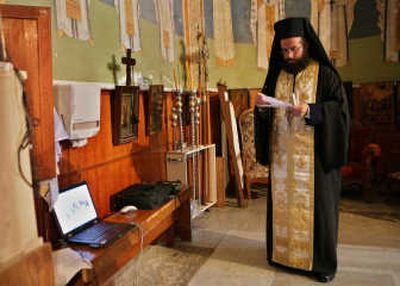Prayers offered via Web

NAZARETH, Israel – Dressed in his embroidered robes, the Rev. Andreas Elime steps from the altar of St. Gabriel’s Church and into the view of the webcams on the church’s marble pillars. His voice fills the empty, 250-year-old sanctuary with a Greek Orthodox hymn while a computer on a nearby pew transmits personal blessings to three Americans thousands of miles away.
Christian pilgrims have long traveled to the boyhood town of Jesus to seek blessings. Now the Internet can save them the trip.
A service recently launched by Modefine Ltd., a Cyprus company, enables worshippers to log on and watch as a priest utters a prayer for them.
“This takes things to a new level,” says James Martin, a Jesuit priest and associate editor of the Roman Catholic magazine America, who has watched religious trends develop on the Internet.
Martin says in a telephone interview that the technology also gives believers a new way to carry out an old practice: asking others to pray for them in sacred places.
“Going to Israel is quite expensive,” he says. “So for people who can’t afford it but can afford their monthly (Internet) bill, this is one way to do it.”
Since opening May 1, the site has fielded hundreds of requests – 70 percent from Americans, but also from Hong Kong, India, Mexico and Australia, says Said Salem, Modefine’s Holy Land representative.
“We have something special here,” he says. “Mary lived here. Jesus grew up here. This is a holy town. This is the basis of Christianity.”
St. Gabriel’s Church stands over the spring where Greek Orthodox tradition says the angel Gabriel appeared to Mary. Catholic tradition holds that this event took place about a mile away, under the modern Basilica of the Annunciation.
Martin’s only concern is the fee: $10 per prayer. Salem says that covers system costs, not the prayer itself, which is free.
“If you come from Jerusalem to get the priest to pray for you, you don’t expect the priest to pay for the taxi,” Salem says. “We are the taxi.”
He says he hopes the service eventually will raise funds for the Nazareth Christian community.
After the opening hymn, Elime prays for mercy, health, peace, forgiveness and salvation. He does services in English, Greek, Arabic and Russian, depending on the request.
He reads the first names on that day’s list, lighting a candle for each. A short benediction closes the service, which lasts about four minutes.
Sitting in the stone-walled courtyard of his nearby monastery after the service, Elime says four priests do two services a day, seven days a week, praying for five to 10 people daily.
“There are some people who can’t come to the church to take Communion, so we go to them,” he says, citing the sick and elderly. Praying for people through the Internet serves the same purpose, he says.
Elime mentions one American man who orders prayers over the Web weekly. Another woman recently placed an order after her daughter disappeared; the daughter was found three days later.
The Web site lets people select a theme for their prayer, but Elime says the same prayer for each person.
Metropolis Kyriakos, the archbishop of Nazareth, says he would prefer people visit the church in person but that he saw nothing wrong with the online ceremony.
“If I even smelled that something was not right, I would cancel it all,” he says, tapping his nose.
For Robert Jeffords, a frequent user of the site, online prayer was the only way to reach the Holy Land.
“I’m 66 now and almost immobile,” Jeffords says by phone from Hollywood, Fla., citing diabetes and leg infections. “So a trip to the Holy Land would be impossible.”
After reading about the service on a Catholic Web site, Jeffords ordered two prayers for his family and was impressed with what he saw.
“I was actually part of it,” says Jeffords, who is Catholic but says he has Greek Orthodox icons on his wall. “I was there.”
He has since ordered two more prayers, one for the anniversary of his mother-in-law’s death, another for his son and his son’s fiancee.
“Thank God for my Internet service,” Jeffords says. “There’s a lot of good stuff on there.
“There’s trash, too, but you can find good stuff if you look around.”